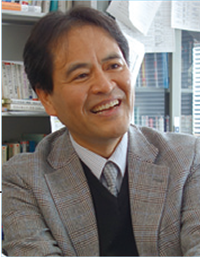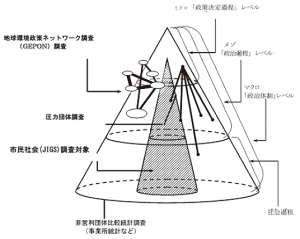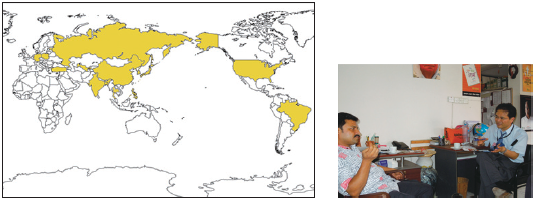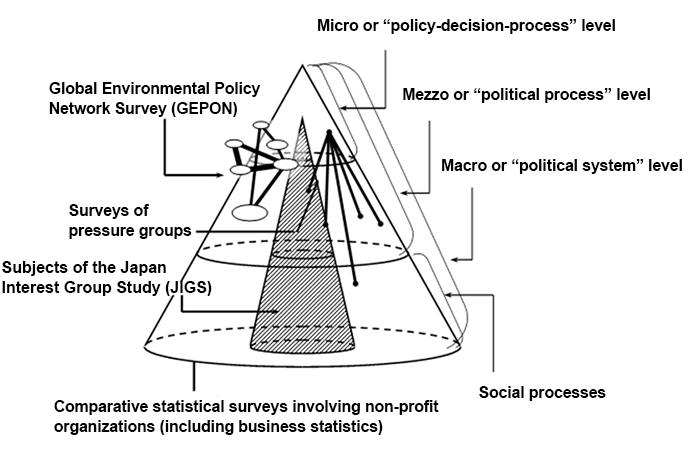キーワード: 市民社会、政策過程、政策ネットワーク、圧力団体、地方政府

前代表の辻中 豊教授にインタビューにこたえていただいた
日本における政権変動、政策パラダイムの変化といった一連の政治変動は、政策過程や市民社会にどのような影響を与えたのでしょうか。歴史を振り返るとき、私たちは起きてしまった政治変動を因果関係で埋めようとしてしまいがちですが、実際は、圧力団体、政策ネットワーク、地方政府・市民社会など、拮抗したさまざまな勢力が活動した結果として生じています。体系的な調査と比較をつうじ、世界各国の政治の構造変動と政治・社会関係の変容の解明に挑戦しているのが、「国際比較日本研究」リサーチユニットです。
世界中が直面している大きな問題の解決にはコミュニティーレベルでの改革が不可欠
私たちは、市民社会、政策過程、政策ネットワークの国際比較研究を継続して行っています(図1)。これらの研究から、地方政府と呼ばれる組織の実態は、「地方」ではなく、社会「基盤」だ、という実感を持っています。この基盤組織の存在は、現在だけでなく日本の未来にとっても、また、世界にとっても非常に重要です。たとえば、テロ、環境、人々の福祉、高齢化社会など、世界が直面しているこれらの課題を解決する鍵は、市民にあります。このような問題は政権トップや科学者がなにかするだけでは解決できませんし、一方で、市民がバラバラに活動していても難しい。「みんなが一緒に活動する」というコミュニティーレベルでの意識改革と非常に連動していることがわかってきました。

図1:国際比較日本研究の関連調査図
日本のソーシャル・キャピタルを世界の資産に
現在、調査対象としている国は15 ヶ国あります(図2)。そのなかで、中国、バングラデシュ、タイでは、日本と同様に、地方政府の自治に市民社会や地元コミュニティーなどの組織、中央・地方の関係が重要なことがわかってきました。また、国際比較をして初めて見えてきた日本の社会全体像もあります。たとえば、選挙や自治会・町内会・子供会・回覧板など、西洋にはないこれらの仕組みが、日本の社会資産、いわば日本のソーシャル・キャピタルだということもわかってきました。日本の市民社会は日本独自の文化・歴史と、外側の文化や社会、科学が融合し形成されてきたものです。国際比較研究することで、各国のローカル・ガバナンスと、ウェルビーイングに貢献できるような人文社会科学的な基礎を提供していきたいと考えています。

図2:15 国調査の対象国とバングラデシュでの調査風景
社会への貢献・実績
- 辻中豊・李景鵬・小嶋華津子編(2014)『現代中国の市民社会・利益団体』木鐸社
- Tsujinaka, Yutaka and Willy Jou, eds. (2015) Civil Society Organizations in
Comparative Perspective (CAJS Monograph Series No. 7)( 2014年度) - CAJS「市民社会ガバナンスの会」:6 月13 日 辻中豊(筑波大学法人文社会系教授)
「 比較の中の中国」他10件(2014年度) - JIGS セミナー(英語):Yutaka Tsujinaka (Professor, Faculty of Humannities and
social Sciences), ”Politics and Civil Society in Japan”他7 件(2014 年度) - 辻中豊(2015)「市民社会の国際比較からみる台湾・日本・中国の将来」
臺灣各大學2015 日本研究聯合論壇、2015 年3 月21 日、台湾。
取材:平成27年7月7日
Research on local governance to promote well-being
Unit members : DADABAEV, Timur Tkach Kawasaki, Leslie Kaigo, Muneo Kaida, Naoko Ohtomo, Takafumi Akashi, Jun-ichi Suzuki, So Choe, Jae Young
Unit name: International, Comparative, and Advanced Japanese Studies
Key words: civil society, policy processes, policy networks, pressure groups, local governments

interviewee; Tsujinaka, Yutaka
How did political changes in Japan, including changes of the government and policy paradigms, affect policy processes or civil society? When we look back on history, we tend to explain the political changes in the past by focusing on causal relationships. However, the political changes actually occurred as results of the activities of different opposing political forces, such as pressure groups, policy networks, local governments, and civil society. The research unit: “International, Comparative, and Advanced Japanese Studies”, conducts structured surveys and comparisons to clarify changes in the political structure of many different countries as well as their political/social relationships.
Necessity of community-level reforms to solve serious global problems
We have been conducting international comparative research on civil society, policy processes, and policy networks (Figure 1). Our studies suggest that local governments are actually social “infrastructures” rather than “local” organizations. Such local governments are significantly important to Japan at present and in its future as well as to other countries across the world. For example, citizens have the key to the solution of various problems faced by the world, such as terrorism, the environment, people’s welfare and aging. These problems cannot be solved by government ministers or scientists alone, or through the activities of small groups of citizens. Solution of these problems is closely related to efforts made at the community level to increase the awareness of “collaborative activities”.

Figure 1: Diagram of surveys related to international comparative research on Japan
Japanese social capitals as the world’s assets
At present, the subjects of our surveys are fifteen countries (Figure 2). The results of these surveys suggest the importance of the involvement of civil society, local communities, and other organizations, as well as relationships between central and local governments, in China, Bangladesh, and Thailand, as they are important in Japan. It would have been difficult to understand a comprehensive picture of Japanese society without conducting international comparisons. The results suggest that elections and systems unique to Japan, such as the activities of community, neighborhood, and children’s associations and circular notices, are actually its social capitals. Japanese civil society was established as a result of the integration of unique Japanese culture and history, the influences of other cultures and societies, and science. We hope that our international comparative studies will provide basic humanities and social scientific knowledge to contribute to the local governances and well-being of many different countries.

Figure 2: Fifteen countries surveyed and a scene of the survey in Bangladesh
Social contributions and achievements
- “Civil society and interest groups in China” edited by Yutaka Tsujinaka, Ri Keiho, Kazuko Kojima (2014), Bokutakusha
- Tsujinaka, Yutaka and Willy Jou, eds. (2015) Civil Society Organizations in Comparative Perspective (CAJS Monograph Series No. 7) (2014)
- “The Conference for Civil Society Governance” of the CAJS on June 13th: “Comparative Analyses of China” by Professor Yutaka Tsujinaka (of the Faculty of Humanities and Social Sciences of the University of Tsukuba) and ten other presentations (2014)
- JIGS Seminar (in English): Yutaka Tsujinaka (Professor, Faculty of Humanities and Social Sciences), “Politics and Civil Society in Japan” and seven other presentations (2014)
- “The futures of Taiwan, Japan, and China discussed through an international comparison study of their civil societies” by Yutaka Tsujinaka (2015)
The 2015 Academic Society for Research on Japan by Universities in Taiwan (2015), March 21, 2015, Taiwan
Interviewed on July 7th, 2015
